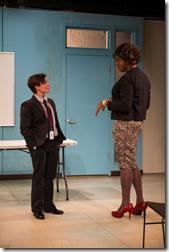
Charm
Written by Philip Dawkins
Steppenwolf Garage, 1624 N. Halsted (map)
thru Nov 8 | tix: $20-$40 | more info
Check for half-price tickets
Defying superlatives, ‘Charm’ is a powerful must-see
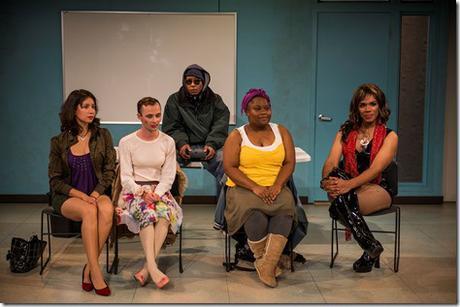
Northlight Theatre presents
Charm
Review by Catey Sullivan
Proper etiquette might not seem like its an essential survival skill if you’re young, trans, jobless, homeless and hundreds of times more likely to the victim of violence than your non-trans peers. But within the confines of a stark classroom at the Center on Halsted, Gloria Allen’s lessons on manners, deportment and the power of an elegant carriage became a lifeline to trans youth struggling to stay alive in a world of relentless cruelty and violence.
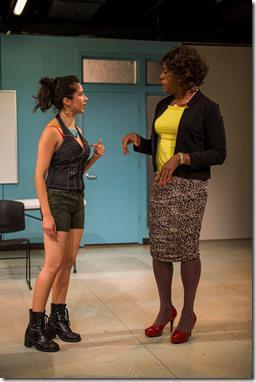
Mama Allen becomes Mama Darleena (Dexter Zollicoffer) in Northlight Theatre’s staging of Charm, a 135-minute drama that’s equal parts inspiring and entertaining. Director BJ Jones deftly manages to capture the relentless brutality that barrages trans people day in and day out. But he also captures the laugh-out- loud humor of the classroom and the wellspring of warmth and human decency that Mama radiated and passed on to her students.
Dawkins hasn’t written a Cinderella-style fairy tale, despite the prominence in the plot of a fancy schmancy tea party at the Drake Hotel. Tea sets and proper waltz form won’t save Mama Darleena’s students. But they will give them hope enough to keep unbearable despair at bay. And hope is an essential commodity in Mama’s world.
The heart of the play is Zollicoffer’s Mama. At 61, she’s a survivor against staggering odds, a woman thriving in a world that would render her invisible at best, and would destroy her at worst. Today, Laverne Cox and Alexandra Billings are stars and role models, and we find pop culture touchstones celebrated on TV, red carpets and magazine covers. In the 1960s when Mama transitioned? Going out in public as yourself could get you arrested, beaten and killed.
Mama somehow came through, and she has no patience with the tantrums and fronting and backstabbing bitchery she sees in the young people who come to her class. There are enough people trying to bring you down on the outside, she asserts, doing the same to yourselves is inexcusable. Zollicoffer makes Mama both larger than life and as relatable as the girl next door. Wherever you fall on the gender spectrum, her insistence on respect – both having it and giving it – will resonate down to your bones.
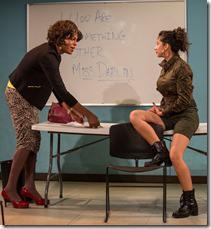
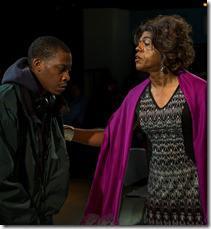
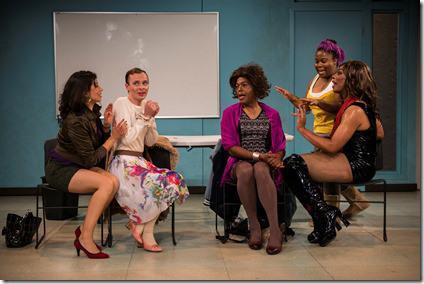
And so will the facades Mama wears both as a form of self-preservation and as a means of letting her students see that things can get better . In Zollicoffer’s fully committed, carefully nuanced performance, Mama is nobody’s victim, But nor is she the unbreakable bulwark of strength and joy she presents. Her life isn’t a charmed circle of close, church-going gal pals and loving family members. There’s a well of terror and sorrow within Mama, and Zollicoffer makes that subtly apparent even when Mama’s at her steeliest.
Jones has pulled together an extraordinary ensemble to play Mama’s students, a group that forms a seamless whole but where every individual is memorable and vivid.
Matthew Sherbach’s shy, mentally unstable Lady will make you weep at his vulnerability, especially in a scene that unfolds in the middle of a dreamy waltz. Surrounded by couples floating by in three quarter time, Lady stands alone, slowly, surely imploding. You can practically feel the moment when Lady’s internal pain and isolation becomes too much to bear. Sherbach’s meltdown monolog – all about just wanting to be “regular” and the knife-edge loneliness of being neither male nor female in a world that demands you pick a side – is a high water mark in a show full of them. If you’re not in tears (or holding them back) at the end of the monologue, you are a sociopath and I want nothing to do with you.
Monica Orozco is a blaze of anger and sensuality as Ariela, a bombshell transwoman who has been forced to do irrevocably damaging things to her own body in order to keep a roof over her head. Her big reveal of precisely how she’s had to game the system is gasp-inducing and a stark, terrifying reminder of how completely the safety nets of social systems can fail.
Armand Fields is marvelous as Jonelle, a Beyonce-like diva who has both the legs and the fashion sense of a super model. She’s a sexpot who is as sweet as an ingenue, and her romance with gay-curious classmate Logan (Awate Serequeberhan) will make your heart glad.
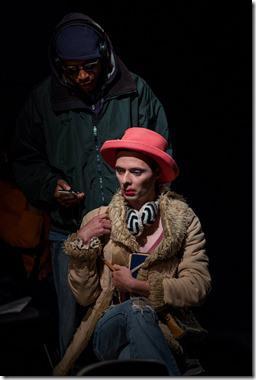
Mama’s class also includes Donnie (Julian Parker) and his wife Victoria (BrittneyLove Smith), a couple that’s managed to stay together despite long bouts of prison and unemployment. Smith radiates kindness and decency, and her speech about yearning to be “pretty” will break your heart a little. Parker’s at a disadvantage in that Donnie is noticeably underwritten. Still, he has you rooting for him.
Charm benefits hugely from Elizabeth Ledo as D, the Center’s besieged director. Working with a grossly inadequate budget, a demanding board and a population of young people who often seem hellbent on self-destruction, D works minor miracles daily just keeping the lights on. When Mama’s class becomes a public relations disaster and a political liability, Ledo’s D embodies all the howling frustration and rage that comes with trying to do good when your circumstances embody a world of bad.
Charm is one of those rare shows that defies superlatives. You can load up a summation of the show with them, but they won’t capture the production’s power. It would be marvelous to see this show move from Steppenwolf’s garage to a Northlight’s Skokie facility for a longer run. Since that’s not likely to happen, we can only urge that you see it while you can.
Rating: ★★★★
Charm continues through November 8th at Steppenwolf Garage, 1624 N. Halsted (map), with performances Wednesdays-Fridays at 8pm, Saturdays 3pm and 8pm, Sundays 3pm. Tickets are $20-$40, and are available by phone (312-335-1650) or online through Steppenwolf.org (check for half-price tickets at Goldstar.com). More information at Northlight.org. (Running time: 2 hours 15 minutes, includes an intermission)
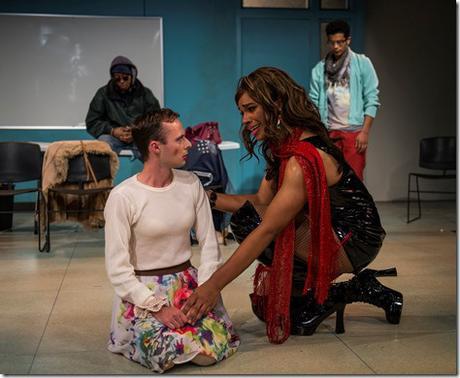
Photos by Michael Brosilow
artists
cast
Dexter Zollicoffer (Mama), Elizabeth Ledo (D), Julian Parker (Donnie), BrittneyLove Smith (Victoria), Monica Orozco (Ariela), Awate Serequeberhan (Logan), Matthew Sherbach (Lady), Armand Fields (Jonelle), Namir Smallwood (Beta)
behind the scenes
BJ Jones (director), Alan E. Schwanke (scenic design,) Izumi Inaba (costume design), JR Lederle (lighting design), Lindsay Jones (original music and sound design), Polly Hubbard (dramaturg) Jonathan Nook (stage manager), Philip Dawkins (playwright), Michael Brosilow (photos)
15-1042

